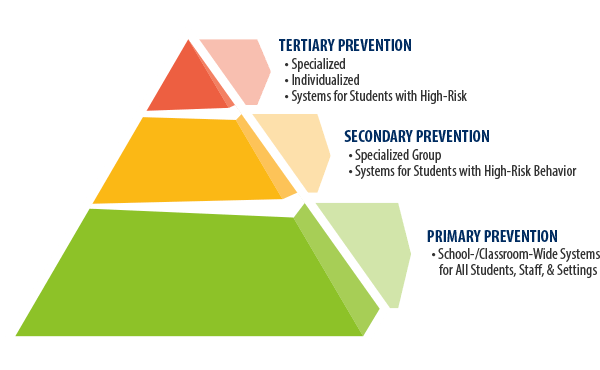What is Positive Behavior Interventions & Support (PBIS)?
One of the foremost advances in school-wide discipline is the emphasis on school-wide systems of support that include proactive strategies for defining, teaching, and supporting appropriate student behaviors to create positive school environments. Instead of using a piecemeal approach of individual behavioral management plans, a continuum of positive behavior support for all students within a school is implemented in areas including the classroom and non-classroom settings (such as hallways, buses, and restrooms).
Positive Behavior Interventions and Supports (PBIS) is a proactive approach to establishing the behavioral supports and social culture and needed for all students in a school to achieve social, emotional and academic success. Attention is focused on creating and sustaining primary (school-wide), secondary (classroom), and tertiary (individual) systems of support that improve lifestyle results (personal, health, social, family, work, recreation) for all youth by making targeted misbehavior less effective, efficient, and relevant, and desired behavior more functional.
The following diagram illustrates the multi-level approach offered to all students in the school. These group depictions represent systems of support not children:

Why is it so important to focus on teaching positive social behaviors?
Frequently, the question is asked, “Why should we have to teach kids to be good? They already know what they are supposed to do. Why can we not just expect good behavior?” In the past, school-wide discipline has focused mainly on reacting to specific student misbehavior by implementing punishment-based strategies including reprimands, loss of privileges, office referrals, suspensions, and expulsions. Research has shown that the implementation of punishment, especially when it is used inconsistently and in the absence of other positive strategies, is ineffective. Introducing, modeling, and reinforcing positive social behavior is an important step of a student’s educational experience. Teaching behavioral expectations and rewarding students for following them is a much more positive approach than waiting for misbehavior to occur before responding. The purpose of school-wide PBIS is to establish a climate in which appropriate behavior is the norm.
Data-Based Decision Making
Data-based decision-making aligns curricular instruction and behavioral supports to student and staff needs. Schools applying PBIS begin by establishing clear expectations for behavior that are taught, modeled, and reinforced across all settings and by all staff. This provides a host environment that supports the adoption and sustained use of effective academic and social/emotional instruction. PBIS has proven its effectiveness and efficiency as an Evidence-Based Practice. (Sugai & Horner, 2007).

